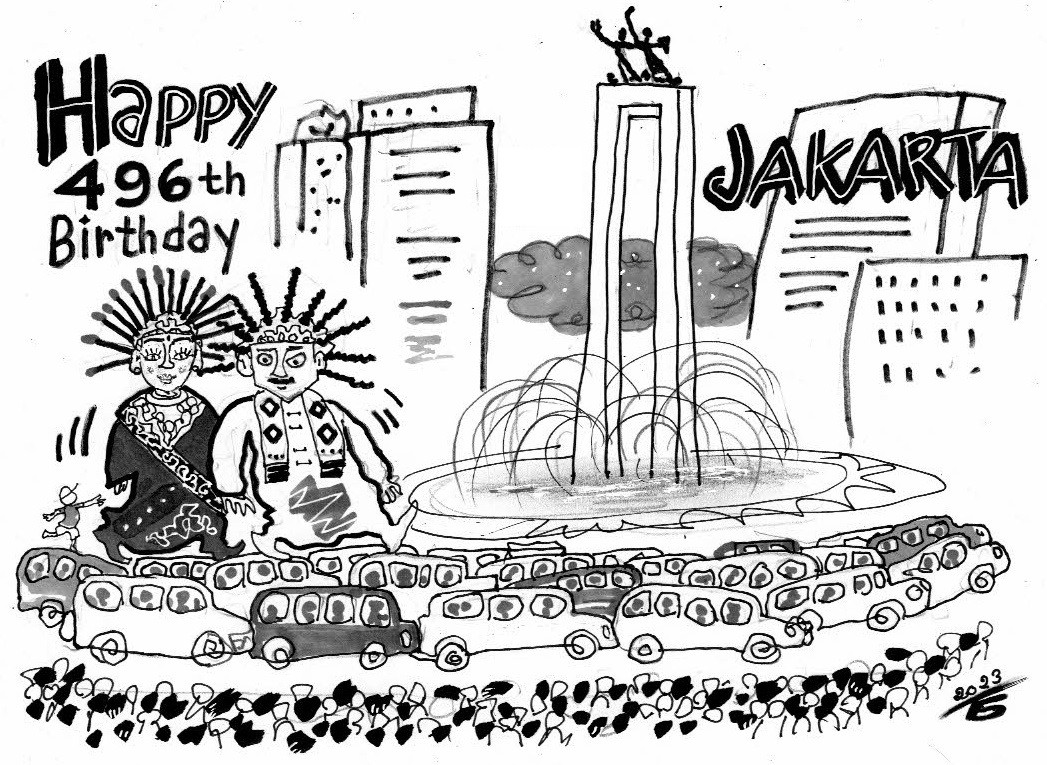Popular Reads
Top Results
Can't find what you're looking for?
View all search resultsPopular Reads
Top Results
Can't find what you're looking for?
View all search resultsBreathless in Jakarta
Jakarta ranks among 61 cities observed worldwide for premature deaths related to air pollution, with more than 1,500 deaths blamed on coal power in 2019.
Change text size
Gift Premium Articles
to Anyone
I
t will be much more difficult for Jakarta to blow its anniversary candles today than in the past, not because the number will be a whopping 496, but because it is getting harder to breathe in the capital city.
The fact that both the central and Jakarta governments have been lacking efforts to address the pollution crisis in the capital is suffocating. Putting aside the daily smog that impairs our visibility, we see no end in sight.
The city administration has claimed to have taken measures to tackle the chronic issue, such as requiring vehicles to undergo regular emissions tests, implementing the odd-even license plate policy, increasing parking fees to reduce traffic and revitalizing pedestrian infrastructure as well as building more open green spaces, limiting emissions from the industrial sector and pushing for a faster transition to greener energy.
But the numbers tell a different story.
In recent weeks, Jakarta has crept into the top of a list of cities with the worst air quality. According to metrics gauged by Swiss climate technology company IQAir, Jakarta recorded an Air Quality Index (AQI) score of 157, placing it squarely in the “unhealthy” category.
Earlier this month, Jakarta’s air was reported to consist of 67 micrograms per cubic meter (µg/m3) of PM 2.5 pollutants: a class of fine breathable matter that is often made out to be the cause of various respiratory diseases, which was 13.4 times higher than the level the World Health Organization (WHO) considers safe.
The city administration has agreed with the report. According to its own analysis, the Jakarta Environment Agency reported that air quality had worsened since April, with an average PM 2.5 level of 29.7 µg/m3, to almost double in the following month with 50.21 µg/m3.
The city said based on the PM 2.5 trend in the past four years, Jakarta's air quality periodically worsens during the dry season in May to August, and improves during the rainy season in September to December.
Activists and residents alike have lamented the lack of improvement in Jakarta's air quality, especially underlining that a September 2021 court ruling found President Joko “Jokowi” Widodo and top-ranking officials in the central and city administrations guilty of negligence for failing to tackle chronic air pollution in the capital.
The Central Jakarta District Court ordered the President, the environment and forestry minister, the health minister, the home minister and the governors of Jakarta, Banten and West Java to tighten environmental regulations, improve air pollution monitoring systems and enforce periodic emissions tests for aging vehicles. The Environment and Forestry Ministry was also ordered to supervise the three governors and ensure their compliance with the court orders.
In October 2022, the Jakarta High Court rejected the central government’s appeal against the district court ruling and urged the government to pursue no further legal action against improving Jakarta’s air quality.
To the exasperation of the public, the government instead challenged the verdict at the Supreme Court, while doing nothing impactful to address the metropolitan’s worsening air quality.
While insufficient investment in public transportation, ineffective urban planning and the absence of green spaces are contributing to the worsening pollution problem, a wider and more collective effort from the leaders in and outside Jakarta is crucial to cope with the air pollution.
Coal-fired power plants, churning around 25 Gigawatt or 55.8 percent of Indonesia’s total coal-fired power plant capacity, stand within 500 kilometers from Jakarta, exposing the city’s population to 125 million tonnes of carbon dioxide emissions per year, according to a report by the C40 Cities network in 2021.
The report ranked Jakarta among the top three of 61 cities observed worldwide for premature deaths related to such pollution, with more than 1,500 deaths blamed on coal power in 2019. That number can double to more than 3,000 if new plants are operational by 2030.
The way things are going, Jakarta may be heading for a biblical ending: a city sunk under water and its residents cursed to gasp for air, unless radical measures are in place to save the city and its people.
Happy birthday, Jakarta. Wish you all the best.











